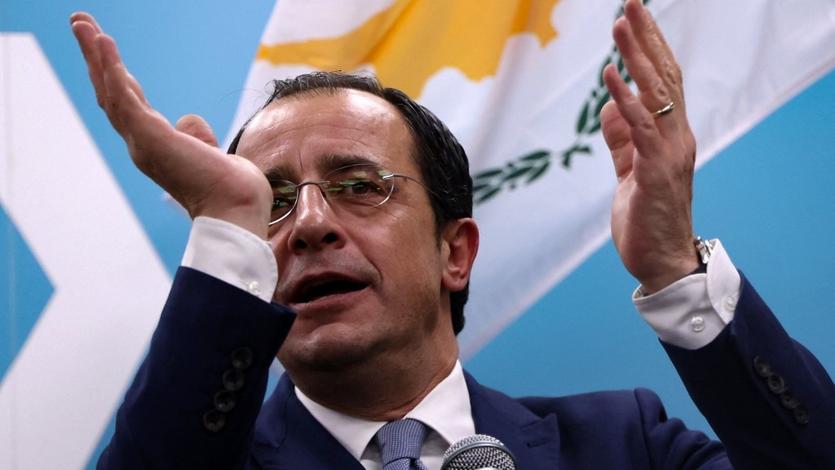 Former Cypriot foreign minister and presidential candidate Nikos Christodoulides, gestures as he gives a statement to the media, following the results of the exit poles of the first round of presidential elections, in his office in the capital Nicosia, on Feb 5, 2023. (PHOTO / AFP)
Former Cypriot foreign minister and presidential candidate Nikos Christodoulides, gestures as he gives a statement to the media, following the results of the exit poles of the first round of presidential elections, in his office in the capital Nicosia, on Feb 5, 2023. (PHOTO / AFP)
NICOSIA — Former foreign minister Nikos Christodoulides took the lead in Cyprus's presidential election on Sunday and will face off against leftist-backed candidate Andreas Mavroyiannis in a runoff on Feb 12.
Christodoulides, running as an independent, took 32 percent of the vote, with career diplomat Andreas Mavroyiannis, backed by the left-wing AKEL party and generally considered an outsider by opinion polls, presenting the surprise at 29.6 percent.
Neophytou had been publicly endorsed by incumbent President Nicos Anastasiades, who by law cannot seek a second five-year term, but his candidacy was overshadowed by Christodoulides
Mavroyiannis's showing defied opinion polls which had shown he would likely trail in third place and would be left out of the runoff. But he had the backing of AKEL, a well-organised party which had cranked up the rallying of its supporters in the past month.
READ MORE: Cyprus poll draws record 14 candidates, clear winner unlikely
"It comes down to Mavroyiannis having the full backing of a party and that Averof (Neophytou) probably didn't," said analyst Fiona Mullen of Sapienta Economics, referring to third-placed Averof Neophytou, leader of the ruling right-wing DISY party. "Its an extraordinary result," she added.
Neophytou had been publicly endorsed by incumbent President Nicos Anastasiades, who by law cannot seek a second five-year term, but his candidacy was overshadowed by Christodoulides, a party member who broke ranks with DISY to run.
Opinion polls had shown Christodoulides gaining roughly one-third of the DISY votes.
The two frontrunners from Sunday's vote will now have a week to win over voters, after which the victor will have to wrestle with how to break a deadlock in reunification talks on ethnically split Cyprus, as well as with irregular migration, labour disputes, and repairing the country's image tarnished by corruption scandals.
READ MORE: Cyprus heads to polls to pick new president
Cyprus was split in a Turkish invasion in 1974 after a brief Greek-inspired coup. The last round of peace talks collapsed in 2017.


